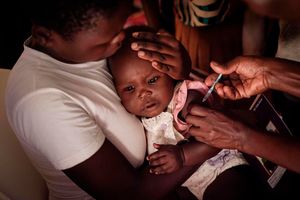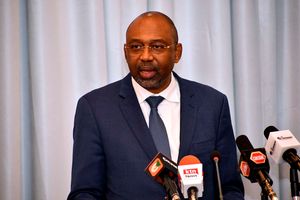Fighting respiratory infections one shot at a time

The RSV maternal vaccination has demonstrated that it can offer up to 70 per cent protection for our babies.
What you need to know:
- The RSV maternal vaccination has demonstrated that it can offer up to 70 per cent protection for our babies.
- The mother is given a single shot anywhere between week 20 and week 35 of pregnancy.
It is the world immunisation week, when we celebrate the second most important invention in our arsenal for fighting infection after antibiotics. This week, we pay homage to all the amazing scientists who, centuries after they are gone, their inventions continue to save lives.
The amazing discoveries made by Edward Jenner and Louis Pasteur set the world of science on a trajectory that we should never take for granted. What these fathers of vaccine development started has morphed into a billion-dollar industry that has no option but to keep inventing solutions for the challenges that surround us.
With the discovery of so many bacterial vaccines, we are finally able to see the benefits of reduced bacterial infections, most especially among young children. The most significant reduction has been in respiratory tract infections. We have managed to successfully put diseases such a diphtheria and whooping cough behind us.
Over the last decade, there has been a remarkable reduction in pneumonia and meningitis caused by Haemophilus influenza and streptococcus bacteria due to the addition of vaccines against these two bacteria to the childhood immunisation schedule.
What has this done for us? It has markedly reduced the rate of severe respiratory tract infections caused by bacteria, most importantly among children aged two and below. Vaccination has reduced the number of babies admitted with severe bacterial pneumonia, reduced the number of babies with severe disease, needing highly specialised care, and reduced infant mortality resulting from the same. But this hasn’t given us full respite. Despite the bacterial infections going down, infants continue to struggle with viral respiratory tract infections that are now taking centre stage. Infants below six months of age are disproportionately affected, with the leading cause being the Respiratory Syncytial Virus (RSV) gaining a lot of attention.
Babies below six months, who are fully vaccinated against bacteria causing pneumonia, still continue to flock our paediatric wards suffering bronchiolitis caused by the RSV. This is a nondescript virus that otherwise minimally affects adults and children above the age of two, but can wreak havoc to the little ones, sometimes even landing them in the critical care unit.
Of note is that the RSV, just like the flu, is a seasonal infection. This is better demonstrated in the countries with defined seasons of spring, summer, autumn and winter. In our setting, with no clear rainy seasons, it seems to spread in a wave, from the eastern Coast to the western part of Kenya over a five to seven-month period.
Being a viral infection, it does not respond to antibiotics and we literally have to watch the little one fight this off on their own. All we can offer is supportive care through it, with the mainstay of treatment being fever control, hydration, oxygen support and managing the excess secretions in the airways.
But now there is a new kid on the block. The RSV vaccine is finally approved for use by the American Food and Drug administration (FDA). The vaccine may not yet be in Kenya for now, but it will surely be on its way as soon as possible.
The vaccine formulation is available in two preparations; the immunoglobulin injections given monthly for five months to the babies during the RSV season, or the single shot given to the mother during pregnancy. The immunoglobulin version may present a logistical challenge of an additional five injections to a baby who is already getting so many other vaccines at the same age. This makes the single shot to the mother in pregnancy a more viable option.
Have we done this before? Absolutely. Lessons learnt in vaccinating the mother, for the purpose of protecting the unborn baby, are astounding. Vaccination of the mother against tetanus reduced newborn tetanus infection by 96 per cent. Neonatal tetanus is a disease that literally has a near 100 per cent mortality for the little ones who get it. To be able to almost fully eliminate the disease is no mean feat.
The RSV maternal vaccination has demonstrated that it can offer up to 70 per cent protection for our babies. The mother is given a single shot anywhere between week 20 and week 35 of pregnancy. The mother then makes antibodies as a response to the vaccine. These antibodies are then transferred to the baby in the womb, conferring protection for the most critical period of birth to six months. As the pharmaceutical companies do their job, the Ministry of Health, with the support of JHPIEGO, and in partnership with the Kenya Paediatric Association and the Kenya Obstetrical and Gynaecological Society, are preparing for the vaccine rollout, once it arrives in Kenya. The Kenya National Immunisation Advisory Group is already looking at the vaccine and discussing the value of incorporating it into the Kenya Vaccination framework. The vaccine preparedness assessment tool is ready.
Last week at the annual scientific congress for the Kenya Paediatric Association, the team was able to extensively discuss the vaccine as part of the dissemination to the congress attendees. The paediatricians, who bear the brunt of having to manage the sick infants, are in full support of maternal immunisation, to tame this menace.
With a demonstrated safety profile for both mother and baby, this new vaccine clearly beefs up our arsenal against preventable infections. It truly is something worth celebrating in this World Immunisation Week!
Dr Bosire is an obstetrician/ gynaecologist





